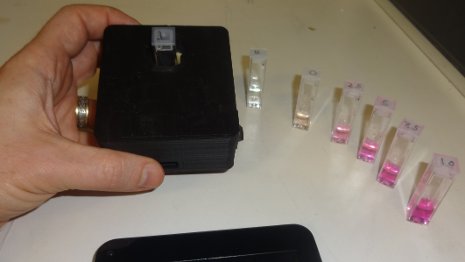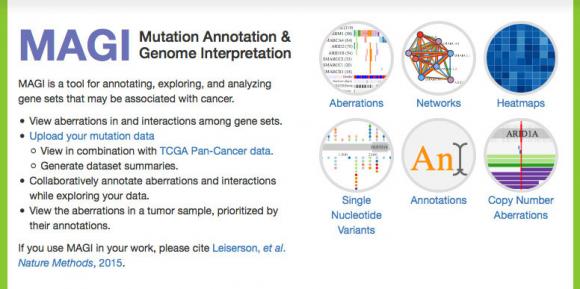 The University of Minnesota is expanding access to clinical trials and supporting the health research community by sharing its clinical trial resource, StudyFinder, with other institutions designated with Clinical and Translational Science Awards (CTSA), a program spearheaded by the National Institutes of Health (NIH). StudyFinder is an online tool pooling clinical trials and research studies in one space, with easy-to-understand language and functions. It helps patients and healthy volunteers get involved and allows researchers to publicize their clinical trials and connect with study volunteers.
The University of Minnesota is expanding access to clinical trials and supporting the health research community by sharing its clinical trial resource, StudyFinder, with other institutions designated with Clinical and Translational Science Awards (CTSA), a program spearheaded by the National Institutes of Health (NIH). StudyFinder is an online tool pooling clinical trials and research studies in one space, with easy-to-understand language and functions. It helps patients and healthy volunteers get involved and allows researchers to publicize their clinical trials and connect with study volunteers.
Open Access
See the following -
Open access: everyone has the right to knowledge
This week, we celebrate open access week – an event aimed at bringing attention to this rapidly emerging form of scientific publication and its ethical imperatives.
- Login to post comments
Open Chemistry Project Upholds Mission of Unorganization, The Blue Obelisk
 Chemistry is not the most open field of scientific endeavor; in fact, as I began working more in the area (coming from a background in physics), I was surprised with the norms in the field. As a PhD student way back in 2003, I simply wanted to draw a 3D molecular structure on my operating system of choice (Linux), and be able to save an image for a paper/poster discussing my research. This proved to be nearly impossible, and in 2005 a group of like-minded researchers got together at a meeting of the American Chemical Society and formed an unorganization: The Blue Obelisk (named after their meeting place in San Diego)...
Chemistry is not the most open field of scientific endeavor; in fact, as I began working more in the area (coming from a background in physics), I was surprised with the norms in the field. As a PhD student way back in 2003, I simply wanted to draw a 3D molecular structure on my operating system of choice (Linux), and be able to save an image for a paper/poster discussing my research. This proved to be nearly impossible, and in 2005 a group of like-minded researchers got together at a meeting of the American Chemical Society and formed an unorganization: The Blue Obelisk (named after their meeting place in San Diego)...
- Login to post comments
Open Content at the Getty: Three Years Later, Some Lessons Learned
Three years ago this week the Getty announced the launch of our Open Content Program, making available 4,600 high-resolution images from the Getty Museum and Getty Research Institute collections for anyone to use, modify, and publish anywhere for any purpose. In his announcement, our president Jim Cuno hinted that more content would be made freely available for reuse in the months to follow, including digital publications and other knowledge resources...
- Login to post comments
Open Data And Open Science
The G8 International Conference on Open Data in April 2013 aimed to make agricultural research more widely available to improve global food security. Carlos Morais Pires from the European Commission discusses the EC’s effort to increase access to data and reviews the G8’s plans. Read More »
- Login to post comments
Open Data Projects Win Wellcome Trust, NIH and HHMI Open Science Prize
 The Open Science Prize, a new initiative from the US National Institutes of Health (NIH), Howard Hughes Medical Institute (HHMI) and the Wellcome Trust, encourages and supports open science approaches that generate benefit to society, advance research and spur innovation. An integral component of the selection process is demonstrated use and generation of open data, so PLOS is proud that this year’s winner of the Open Science Prize is PLOS author and evolutionary, computational biologist Trevor Bedford of the Fred Hutchinson Cancer Research Center in Seattle, Washington...
The Open Science Prize, a new initiative from the US National Institutes of Health (NIH), Howard Hughes Medical Institute (HHMI) and the Wellcome Trust, encourages and supports open science approaches that generate benefit to society, advance research and spur innovation. An integral component of the selection process is demonstrated use and generation of open data, so PLOS is proud that this year’s winner of the Open Science Prize is PLOS author and evolutionary, computational biologist Trevor Bedford of the Fred Hutchinson Cancer Research Center in Seattle, Washington...
- Login to post comments
Open Health News (OHNews) 2013 Readers Choice - Top Picks
The numbers on the 'Open Source' movement and solutions continue to climb and go through the roof - whether its about usage of 'open source' operating systems, browsers, content management systems, market share, job opportunities, new companies, open data, mobile apps, open hardware products, and more. Just do your own web search for the numbers. This trend also holds true for the healthcare industry and 'open' health IT systems. Check out the most viewed 'Open Health' projects, systems, publications, and resources by Open Health News (OHNews) Readers in 2013. Read More »
- Login to post comments
Open Health: What Is It And Why Should You Care?
“Open health” captures a broad set of information technologies that will change the way we approach health and health care. It encompasses “ehealth” (the storage and provision of personal medical information online) but also includes the release of health information to the public at large. It’s the health side of “open data” policies being pursued by countries all over the world. Read More »
- Login to post comments
Open Publishing Can Improve Access To Knowledge
There have been increasing demands for more transparency in the reporting of research findings, which has built up pressure on all those involved in making and testing potential new drugs, biologics and medical devices.
- Login to post comments
Open Scholarship On The Rise
The open source approach has permeated even the dusty corners of academia. Open scholarship is a growing movement to make academic research publicly accessible, instead of tucked away in journals that are only available by subscription. Read More »
- Login to post comments
Open source bionic leg: First-of-its-kind platform aims to rapidly advance prosthetics
 A new open-source, artificially intelligent prosthetic leg designed by researchers at the University of Michigan and Shirley Ryan AbilityLab is now available to the scientific community. The leg's free-to-copy design and programming are intended to improve the quality of life of patients and accelerate scientific advances by offering a unified platform to fragmented research efforts across the field of bionics. "Our Open-Source Bionic Leg will enable investigators to efficiently solve challenges associated with controlling bionic legs across a range of activities in the lab and out in the community," said lead designer Elliott Rouse, core faculty at U-M's Robotics Institute and assistant professor of mechanical engineering.
A new open-source, artificially intelligent prosthetic leg designed by researchers at the University of Michigan and Shirley Ryan AbilityLab is now available to the scientific community. The leg's free-to-copy design and programming are intended to improve the quality of life of patients and accelerate scientific advances by offering a unified platform to fragmented research efforts across the field of bionics. "Our Open-Source Bionic Leg will enable investigators to efficiently solve challenges associated with controlling bionic legs across a range of activities in the lab and out in the community," said lead designer Elliott Rouse, core faculty at U-M's Robotics Institute and assistant professor of mechanical engineering.
- Login to post comments
Open Source Space Academy Opens in Nairobi
 Nairobi's Tunapanda Institute has been using open source tools to provide technology, design, and business training in East Africa since its inception in 2013. Next year the school will launch a "space academy" to inspire young people to think about some of the most critical challenges facing humanity on this planet and beyond. Tunapanda's founders believe that everyone should have the opportunity to help shape the future, and in order for that to happen there must be learning materials and tools that are open, shareable, and unrestricted so that anyone, no matter their financial or educational background, can learn and be inspired.
Nairobi's Tunapanda Institute has been using open source tools to provide technology, design, and business training in East Africa since its inception in 2013. Next year the school will launch a "space academy" to inspire young people to think about some of the most critical challenges facing humanity on this planet and beyond. Tunapanda's founders believe that everyone should have the opportunity to help shape the future, and in order for that to happen there must be learning materials and tools that are open, shareable, and unrestricted so that anyone, no matter their financial or educational background, can learn and be inspired.
- Login to post comments
Open Source Tech Revolutionizes Water Pollution Testing Equipment
 High nitrate levels in water cause the dead zones in the world’s largest deltas. Using too much nitrogen fertilizer wastes resources and leads to nitrate in runoff and water wells and an excess of nitrate in drinking water is a health hazard to infants and harmful to many animals. Current portable nitrate testers range in price and accuracy, from ballpark data at low price points to several hundred dollars for a handheld photometer. This new design is palm-sized, interfaces with a free Android app, costs less than $65 to manufacture and uses green chemistry for a safer and more accurate testing procedure. “This is a Popeye-approved reagent methodology,” Pearce jokes, adding that the enzyme used in the test kit is found in spinach and other leafy greens. “We’re replacing a toxic heavy metal with something that you eat every day in your salad.”
High nitrate levels in water cause the dead zones in the world’s largest deltas. Using too much nitrogen fertilizer wastes resources and leads to nitrate in runoff and water wells and an excess of nitrate in drinking water is a health hazard to infants and harmful to many animals. Current portable nitrate testers range in price and accuracy, from ballpark data at low price points to several hundred dollars for a handheld photometer. This new design is palm-sized, interfaces with a free Android app, costs less than $65 to manufacture and uses green chemistry for a safer and more accurate testing procedure. “This is a Popeye-approved reagent methodology,” Pearce jokes, adding that the enzyme used in the test kit is found in spinach and other leafy greens. “We’re replacing a toxic heavy metal with something that you eat every day in your salad.”
- Login to post comments
Open Source Web App Helps Researchers Explore Cancer Genetics
 Brown University computer scientists have developed a new interactive tool to help researchers and clinicians explore the genetic underpinnings of cancer. The tool — dubbed MAGI, for Mutation Annotation and Genome Interpretation — is an open-source web application that enables users to search, visualize, and annotate large public cancer genetics datasets, including data from The Cancer Genome Atlas (TCGA) project. “The main motivation for MAGI has been to reduce the computational burden required for researchers or doctors to explore and annotate cancer genomics data,” said Max Leiserson, a Ph.D. student at Brown who led the development of the tool.
Brown University computer scientists have developed a new interactive tool to help researchers and clinicians explore the genetic underpinnings of cancer. The tool — dubbed MAGI, for Mutation Annotation and Genome Interpretation — is an open-source web application that enables users to search, visualize, and annotate large public cancer genetics datasets, including data from The Cancer Genome Atlas (TCGA) project. “The main motivation for MAGI has been to reduce the computational burden required for researchers or doctors to explore and annotate cancer genomics data,” said Max Leiserson, a Ph.D. student at Brown who led the development of the tool.
- Login to post comments
Open-source Code Leads to the Adoption of University of Minnesota's StudyFinder by Additional Translational Medicine Research Institutions
- Login to post comments
Opening Access – Views From The South
Open access initiatives help African countries to face development challenges. Read More »
- Login to post comments